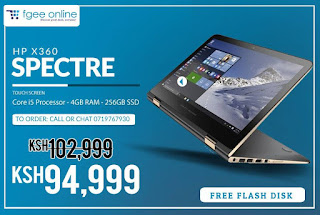 |
| Hard disks at fgee.co.ke |
Until recently, every other desktop or laptop form factor
had a hard disk drive (HDD). Now, you can configure your system with either an
HDD or SSD, or in some cases both. But how do you choose? We explain the
differences between the two and also highlight the advantages and disadvantage
of both to help you decide.
HDD and SSD Explained
The traditional spinning hard drive is the basic non-volatile
storage on a computer. That is, information on it doesn't "go away"
when you turn off the system, as is true of data stored in RAM. A hard drives
is essentially a metal platter with a magnetic coating that stores your data,
whether weather reports from the last century, a high-definition copy of the
Star Wars trilogy, or your digital music collection. A read/write head on an
arm accesses the data while the platters are spinning.
An SSD does functionally everything a hard drive does, but
data is instead stored on interconnected flash memory chips that retain the
data even when there's no power present. These flash memory chips are of a
different type than is used in USB thumb drives, and are typically faster and
more reliable. SSDs are consequently more expensive than USB thumb drives of
the same capacities.
If you are seriously considering either for purchase you
should consider the factors below
HDDs
• Enthusiast multimedia users and heavy downloaders: Video
collectors need space, and you can only get to 4TB of space cheaply with hard
drives.
• Budget buyers: Ditto. Plenty of cheap space. SSDs are too
expensive for KSH 28,000 PC buyers.
• Graphic arts and engineering professionals: Video and
photo editors wear out storage by overuse. Replacing a 1TB hard drive will be
cheaper than replacing a 500GB SSD.
• General users: General users are a toss-up. Folks who
prefer to download their media files locally will still need a hard drive with
more capacity. But if you mostly stream your music and videos online, then
buying a smaller SSD for the same money will give you a better experience.
SSDs
• Road warriors: People who shove their laptops that may not
be fully asleep into their bags indiscriminately will want the extra security
of an SSD. This also includes folks who
work in the field, like utility workers and university researchers.
• Speed demons: If you need things done now, spend the extra
bucks for quick boot-ups and app launches. Supplement with a storage SSD or
hard drive if you need extra space (see below).
• Graphic arts and engineering professionals: Yes, I know I
said they need hard drives, but the speed of an SSD may make the difference
between completing two proposals for your client and completing five. These
users are prime candidates for dual-drive systems (more on that below).
• Audio engineers and musicians: If you're recording music,
you don't want the scratchy sound from a hard drive intruding. Go for quieter
SSDs.
It's unclear whether SSDs will totally replace traditional
spinning hard drives, especially with shared cloud storage waiting in the
wings. The price of SSDs is coming down, but they're still too expensive to
totally replace the terabytes of data that some users have in their PCs and
Macs. Cloud storage isn't free, either: You'll continue to pay as long as you
want personal storage on the Internet. Local storage won't go away until we
have ubiquitous wireless Internet everywhere, including out in the wild. Of
course, by that time, there may be something better.
RELATED ARTICLES:
Discover our wide collection of Hard disks in our online store and shop from anywhere and at anytime with convenience. Visit www.fgee.co.ke

We have the most affordable electronic and I.T products in Nairobi, Kenya.

No comments:
Post a Comment